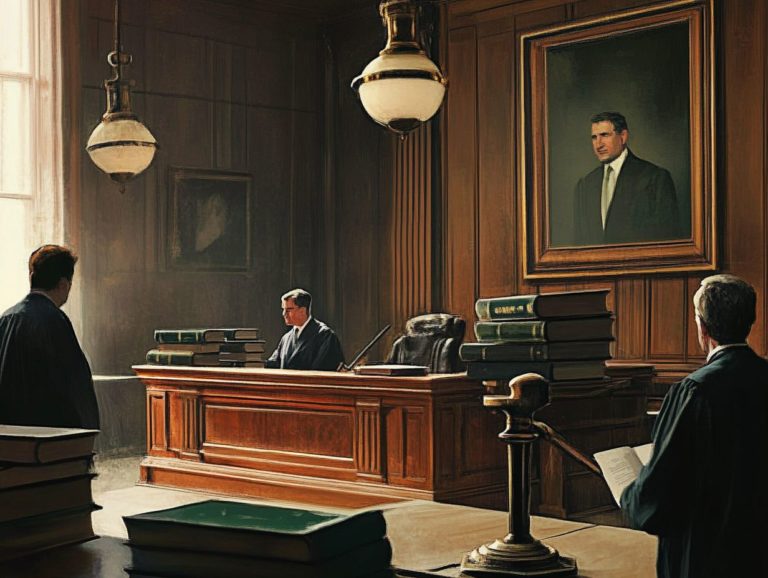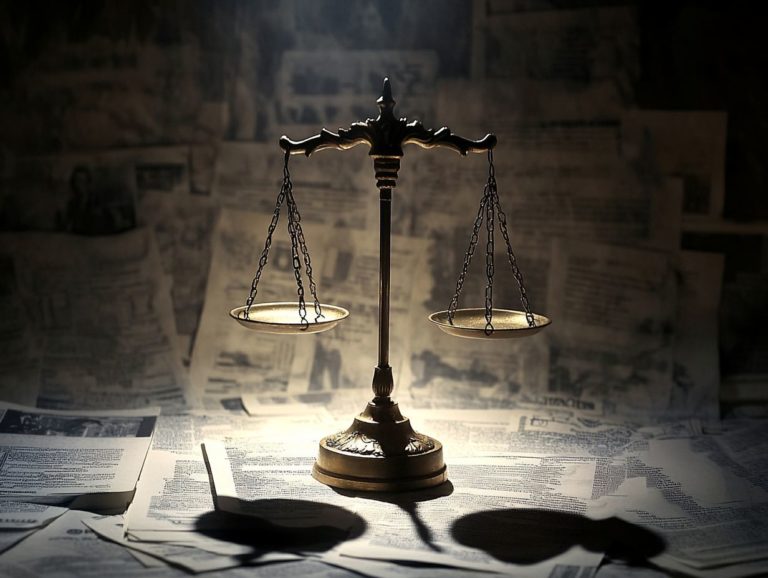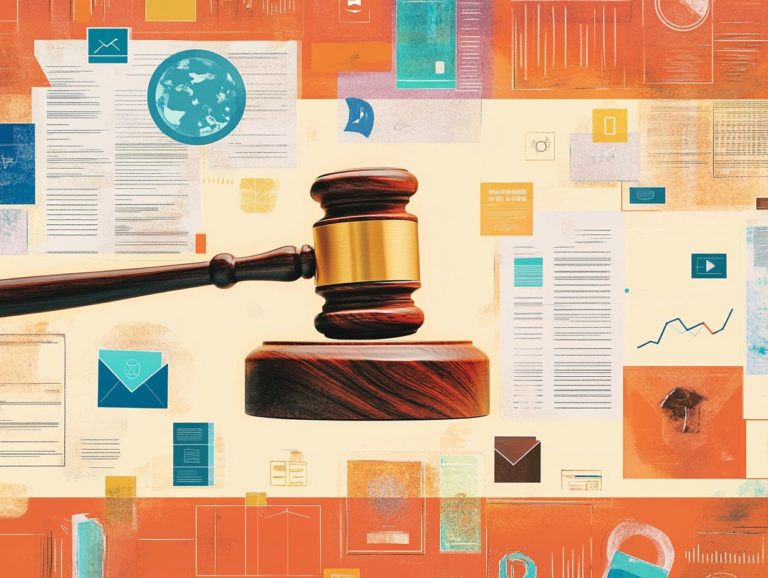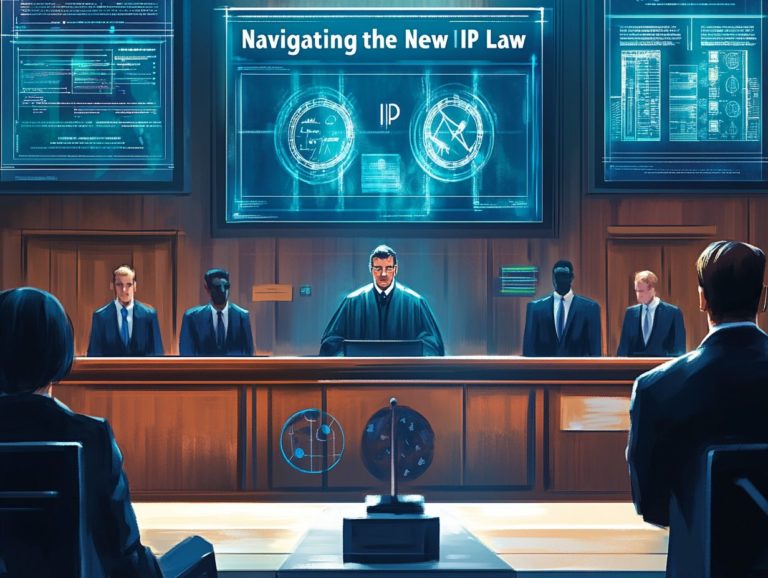Understanding the Role of the Jury in IP Litigation
In the realm of IP litigation, jury trials play a crucial role. They provide a unique perspective on complex legal matters.
This article explores the importance of jury trials in IP cases. It examines their usage and the critical decisions jurors must make.
This article presents effective strategies for delivering compelling arguments that resonate with jurors.
Join us as we explore the exciting dynamics of jury trials within IP litigation.
Contents
- Key Takeaways:
- The Importance of Jury Trials in IP Litigation
- The Role of the Jury in IP Litigation
- The Selection Process for Jury Members
- Strategies for Presenting to a Jury in IP Cases
- Frequently Asked Questions
- What is the role of the jury in IP litigation?
- What types of cases involving intellectual property rights may require a jury?
- How are jurors selected for IP litigation cases?
- What factors may influence the jury’s decision in an IP litigation case?
- Can a jury’s decision in an IP litigation case be appealed?
- What happens if the jury is unable to reach a unanimous decision in an IP litigation case?
Key Takeaways:
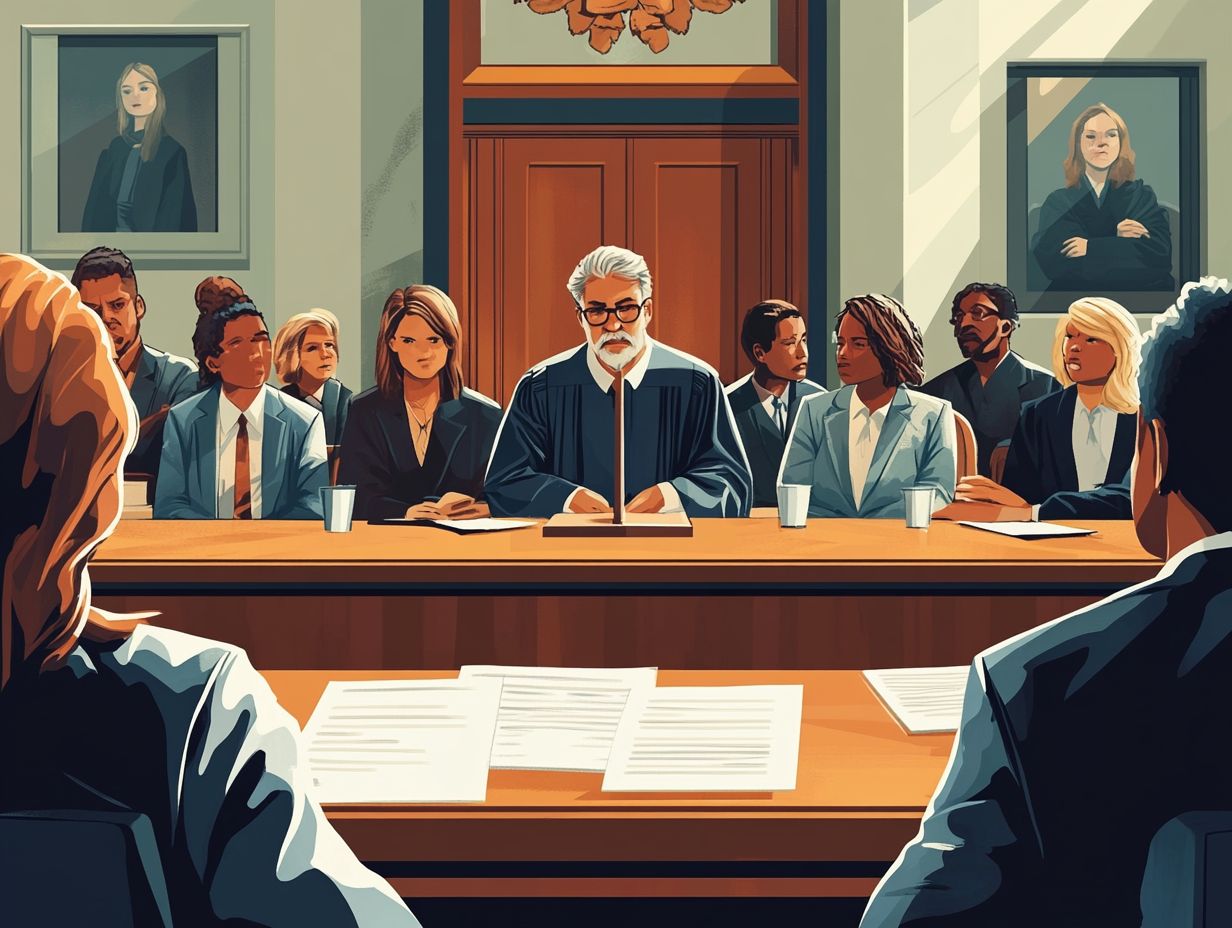
Jury trials are crucial in IP litigation. They ensure a fair decision-making process for both parties involved.
The jury assesses the evidence and makes decisions based on the law and facts. Effective communication and highlighting key evidence are essential strategies.
The Importance of Jury Trials in IP Litigation
Jury trials are vital in IP litigation, especially in patent cases. Jurors’ understanding of complex legal matters can greatly influence trial outcomes.
Jurors ensure that community perspectives are part of the justice system. This involvement enhances the system’s legitimacy.
By engaging with evidence, evaluating legal arguments, and interpreting instructions, jurors play a key role in determining infringement and damages.
Why Are Jury Trials Used in IP Cases?
Jury trials guarantee community representation. Jurors carefully consider the facts and legal arguments presented by both sides.
This process fosters shared responsibility among citizens. They contribute their perspectives and life experiences to the deliberation.
Jury trials empower individuals without legal training to address challenging IP issues. They engage with complex concepts using their reasoning skills.
Jurors significantly impact case presentations. Lawyers must adapt their strategies to engage jurors by focusing on clarity.
This often results in a trial process that educates the jury. It enhances the judicial system’s transparency.
The Role of the Jury in IP Litigation
The jury is crucial in IP litigation. They evaluate evidence, interpret instructions, and render verdicts that shape patent disputes.
Their responsibilities include assessing expert testimony and understanding patent law. They weigh the arguments of both plaintiff and defendant lawyers.
Through deliberation, the jury strives to reach a unanimous verdict. This verdict reflects their collective understanding of infringement and validity claims.
What Does the Jury Decide?
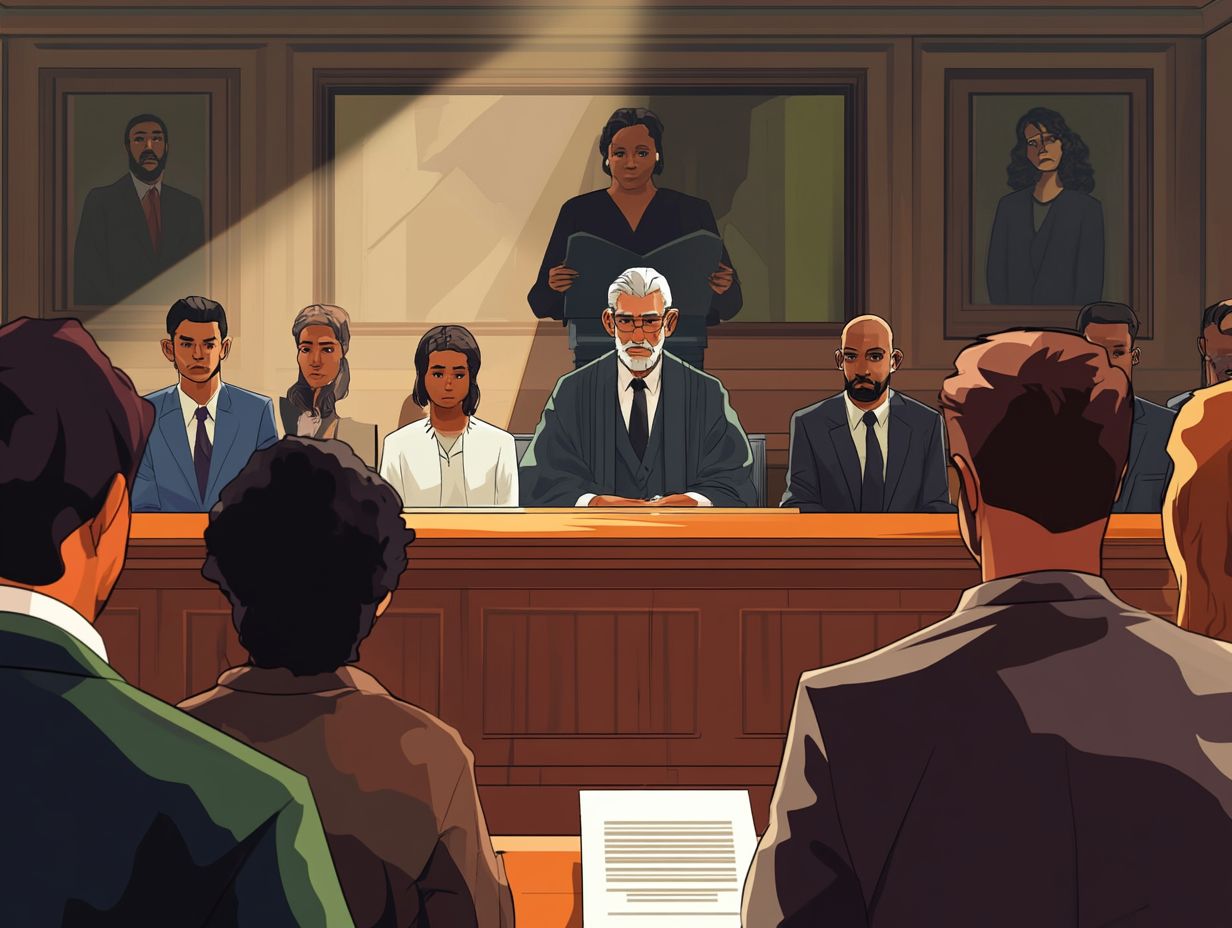
The jury is key in making big decisions about patents and damages, leading to a verdict that reflects their collective judgment.
These decisions aren t made in isolation; the jury analyzes the evidence, weighs witness credibility, and navigates the complex details of the patent rights involved.
As they consider the case, jurors also reflect on the impact of their findings on both the plaintiff, who seeks recognition for their innovation, and the defendant, who aims to defend their business and manage financial risks.
This evaluation process highlights the jury’s essential role in balancing fairness and legal insight, influencing intellectual property law’s landscape.
How Does the Jury Make Decisions?
The jury starts a clear decision-making process by reviewing the evidence, following the judge’s instructions, and engaging in discussions to reach a consensus.
This procedure compels jurors to assess each piece of evidence for relevance and credibility while navigating the necessary legal standards.
During deliberation, jurors confront personal biases that influence their perceptions, emphasizing the need for impartiality in their decision-making.
The discussions within the jury room help address these biases, fostering equitable deliberation aimed at achieving a fair outcome.
The Selection Process for Jury Members
Jury selection is a crucial step in any trial. In intellectual property cases, the impartiality and background of jurors can greatly impact the outcome.
During this process, trial lawyers engage in voir dire, a questioning process to find out biases and overall suitability of prospective jurors.
This scrutiny makes sure the jury can fairly evaluate the evidence and legal arguments while managing their roles in the courtroom.
Criteria for Jury Selection
The criteria for jury selection involve assessing the background, beliefs, and biases of potential jurors to ensure a fair trial process.
This evaluation is especially crucial in complex cases like intellectual property litigation, where a nuanced understanding is essential.
Jurors bring unique life experiences that influence their perspectives on the evidence presented.
For example, someone with a technical background may interpret intellectual property concepts differently than a person with an artistic inclination.
Potential biases, arising from personal experiences or societal influences, further shape their decision-making process.
By analyzing these factors, the legal system strives to uphold the jury’s integrity, ensuring a fair trial that respects the nuances of intellectual property disputes.
Challenges and Jury Selection
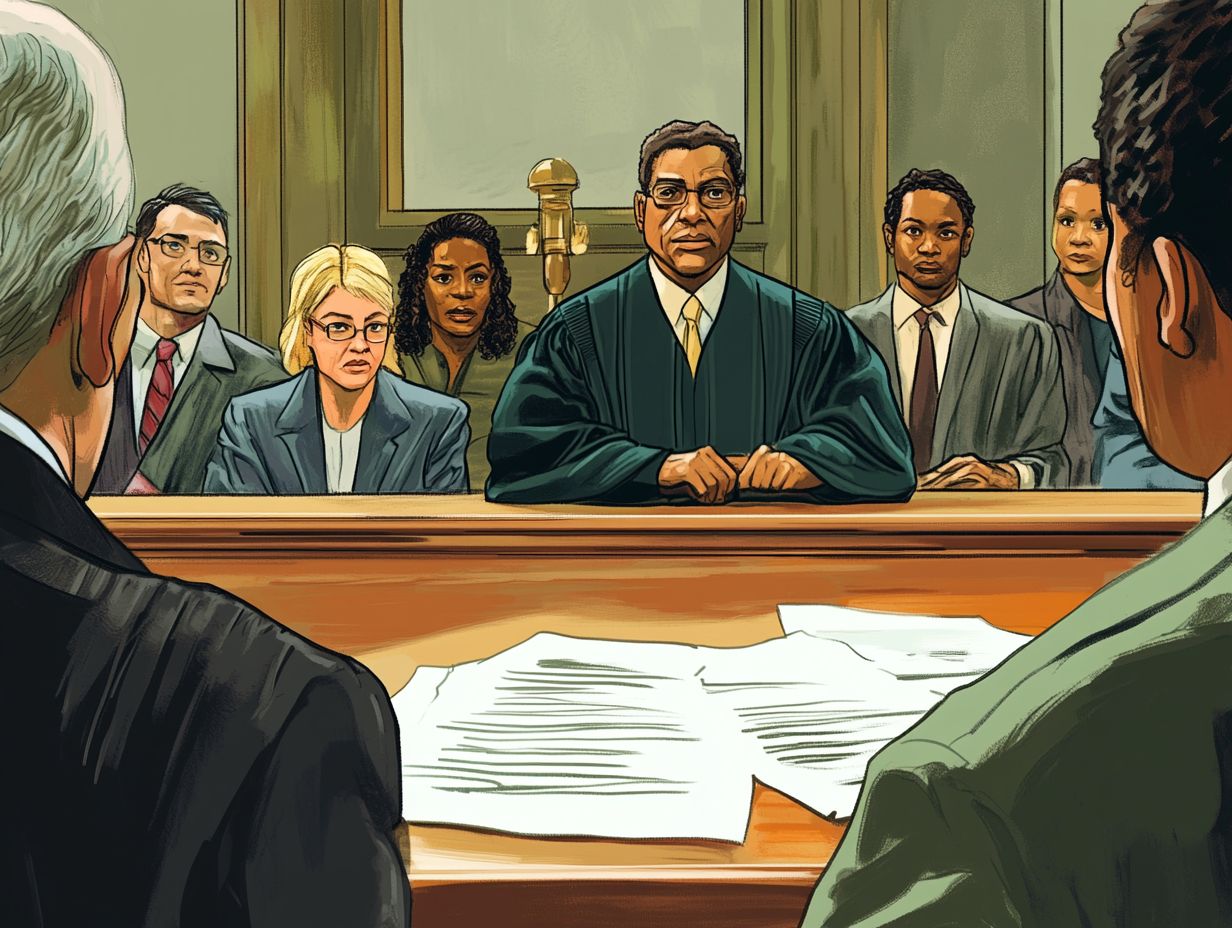
Navigating the jury selection process is crucial. This ensures that the jurors selected can serve impartially during the trial.
This phase helps identify any preconceived notions potential jurors may have. It also reveals their attitudes and experiences that could influence their judgment.
As a trial lawyer, you know how important thorough questioning is. This allows you to uncover biases that could jeopardize the trial’s integrity.
By effectively using jury challenges, you can remove unsuitable jurors. This helps uphold fairness in the judicial process.
This careful examination of juror backgrounds maintains transparency in courtroom procedures. It ultimately fosters public confidence in the judicial system.
Strategies for Presenting to a Jury in IP Cases
Successfully presenting a case to a jury in IP litigation requires careful planning. You must convey complex legal issues while engaging jurors with the evidence.
You need to navigate courtroom dynamics with skill. Employ techniques that resonate with jurors and clarify patent law intricacies.
Crafting a compelling story that connects with jurors is essential. It persuades them about the strengths or weaknesses of a patent claim.
Effective Communication Techniques
Effective communication is key for trial lawyers. Your aim is to engage jurors through storytelling and clear evidence presentation.
Using relatable narratives helps the jury visualize the case. This fosters empathy and understanding.
Incorporating visual aids simplifies complex arguments. This makes the information easier to grasp and remember.
It’s crucial to hold jurors’ attention throughout the trial. A captivated jury is more likely to understand the relevant issues.
Your goal is to create an environment where jurors feel informed and motivated to deliberate thoughtfully on the case.
Key Evidence and Arguments to Emphasize
In patent litigation, emphasizing key evidence can dramatically influence jurors’ perceptions. This often includes expert testimony that simplifies complex concepts.
Examine documents such as patent filings and correspondence carefully. Demonstrative evidence like charts can clarify events and reinforce your arguments.
Your focus should be on highlighting these elements to strengthen your case. Anticipating opposing strategies helps you craft a compelling narrative.
Frequently Asked Questions
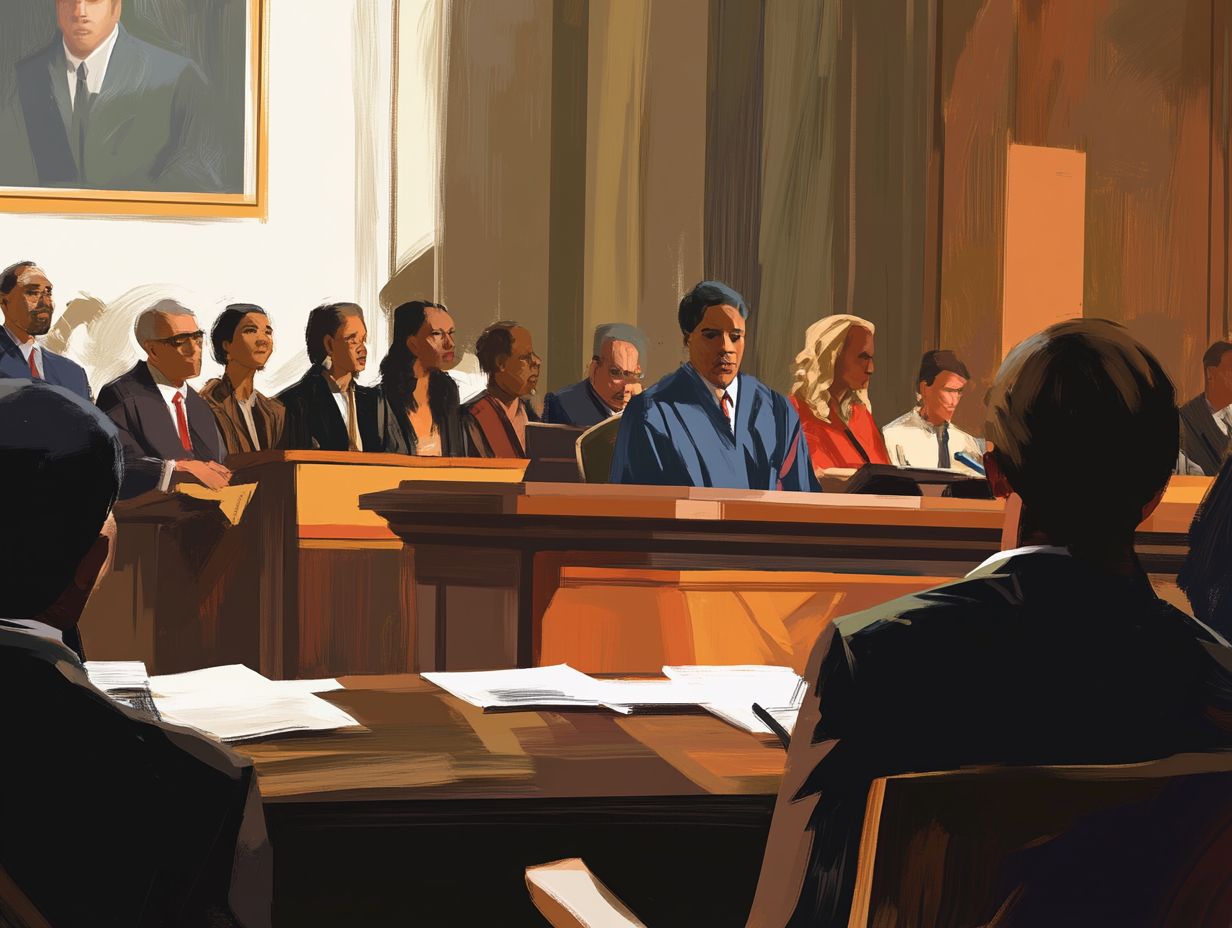
What is the role of the jury in IP litigation?
The jury’s role in IP litigation is to decide if the accused party has infringed on the plaintiff’s intellectual property rights. They evaluate evidence and reach a verdict based on the facts presented.
What types of cases involving intellectual property rights may require a jury?
Juries are typically used in cases involving copyright, patent, trademark, and trade secret infringement. These cases can be complex, making a jury essential for a fair trial.
How are jurors selected for IP litigation cases?
Jurors are randomly selected from a pool of potential jurors. They must be citizens of the jurisdiction and have no prior involvement in the case.
What factors may influence the jury’s decision in an IP litigation case?
The jury’s decision can be influenced by various factors. These include the strength of the evidence, the arguments made by each side, and the jurors’ personal biases.
Can a jury’s decision in an IP litigation case be appealed?
Yes, a jury’s decision can be appealed! This allows a higher court to review the case for any legal mistakes, which is crucial for justice.
What happens if the jury is unable to reach a unanimous decision in an IP litigation case?
If the jury cannot reach a unanimous decision, it’s called a “hung jury.” The judge may declare a mistrial, requiring a retrial with a new jury.



